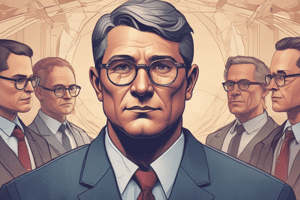Podcast
Questions and Answers
What is one suggested method to improve production costs and material quality?
What is one suggested method to improve production costs and material quality?
- Standardization of tools and equipment (correct)
- Using more expensive materials
- Implementing overtime pay
- Increase the number of workers
What kind of wage system did Taylor propose to motivate workers?
What kind of wage system did Taylor propose to motivate workers?
- Commission-based pay
- Flat salary system
- Hourly wage system
- Differential piece-rate plan (correct)
According to Fayol, which principle helps in improving productivity and efficiency?
According to Fayol, which principle helps in improving productivity and efficiency?
- Unity of command
- Stability of tenure
- Centralization of management
- Division of work (correct)
What role does discipline play in management according to Fayol?
What role does discipline play in management according to Fayol?
What does authority enable management to do, according to Fayol?
What does authority enable management to do, according to Fayol?
What was a key aspect of Taylor's scientific task setting?
What was a key aspect of Taylor's scientific task setting?
Which principle of management emphasizes accountability in a managerial role?
Which principle of management emphasizes accountability in a managerial role?
What did Fayol aim to achieve with his principles of management?
What did Fayol aim to achieve with his principles of management?
What is the primary goal of democratic leadership?
What is the primary goal of democratic leadership?
Which characteristic is NOT associated with laissez-faire leadership?
Which characteristic is NOT associated with laissez-faire leadership?
What is a potential disadvantage of laissez-faire leadership?
What is a potential disadvantage of laissez-faire leadership?
How does bureaucratic leadership primarily function?
How does bureaucratic leadership primarily function?
Which characteristic is emphasized in democratic leadership?
Which characteristic is emphasized in democratic leadership?
Which aspect is a key characteristic of laissez-faire leadership?
Which aspect is a key characteristic of laissez-faire leadership?
What is a common outcome of a bureaucratic leadership style?
What is a common outcome of a bureaucratic leadership style?
Which leadership style is best suited for promoting employee problem-solving involvement?
Which leadership style is best suited for promoting employee problem-solving involvement?
What role does management play in fostering a positive work environment according to the concept of Esprit de Corps?
What role does management play in fostering a positive work environment according to the concept of Esprit de Corps?
Who is recognized as the 'Father of Organizational Theory'?
Who is recognized as the 'Father of Organizational Theory'?
What is a key characteristic of a bureaucratic organization?
What is a key characteristic of a bureaucratic organization?
According to Max Weber's theory, how are selections and promotions determined in a bureaucratic organization?
According to Max Weber's theory, how are selections and promotions determined in a bureaucratic organization?
What does the principle of Unity of Command emphasize?
What does the principle of Unity of Command emphasize?
What is NOT one of the three elements that support bureaucratic management?
What is NOT one of the three elements that support bureaucratic management?
Which principle ensures that all personnel in a company work towards a common goal?
Which principle ensures that all personnel in a company work towards a common goal?
What is the primary focus of Max Weber's Bureaucratic Theory?
What is the primary focus of Max Weber's Bureaucratic Theory?
Which of the following best defines bureaucracy according to Max Weber?
Which of the following best defines bureaucracy according to Max Weber?
How should remuneration be ideally structured according to organizational principles?
How should remuneration be ideally structured according to organizational principles?
What is the significance of Centralization in an organization?
What is the significance of Centralization in an organization?
What does the division of labor in a bureaucratic organization primarily help to achieve?
What does the division of labor in a bureaucratic organization primarily help to achieve?
Which principle relates to maintaining a well-defined order within the workplace?
Which principle relates to maintaining a well-defined order within the workplace?
What does Subordination of Individual Interest imply for employees?
What does Subordination of Individual Interest imply for employees?
What does the principle of Stability refer to in an organizational context?
What does the principle of Stability refer to in an organizational context?
Which principle encourages employees to take initiatives within an organization?
Which principle encourages employees to take initiatives within an organization?
What is Mary Parker Follett's view on the essence of leadership?
What is Mary Parker Follett's view on the essence of leadership?
Which of the following reflects Follett's approach to conflict resolution?
Which of the following reflects Follett's approach to conflict resolution?
What does Follett mean by the 'coactive' approach to power?
What does Follett mean by the 'coactive' approach to power?
What is one of the key principles of Follett's theory of management?
What is one of the key principles of Follett's theory of management?
Which statement best describes the concept of 'Reciprocal Relationships' in Follett's Principles of Coordination?
Which statement best describes the concept of 'Reciprocal Relationships' in Follett's Principles of Coordination?
How does Follett view the role of managers in the early stages of coordination?
How does Follett view the role of managers in the early stages of coordination?
Which principle of Follett emphasizes ongoing efforts in management?
Which principle of Follett emphasizes ongoing efforts in management?
What does Follett's concept of 'powering with' suggest?
What does Follett's concept of 'powering with' suggest?
Flashcards are hidden until you start studying
Study Notes
Democratic Leadership
- Redistributes power and authority between managers and employees, enhancing participation in decision-making.
- Ideal for teams interested in inclusive problem-solving.
- Aims to increase employee engagement in roles and organizational goals.
- Characteristics include promoting creativity, collaboration, regular feedback, team player mindset, flexibility, and transparency.
Laissez-Faire Leadership
- Characterized by high delegation and minimal supervision, granting team members autonomy.
- Also known as “delegative leadership,” allowing employees to be primary decision-makers.
- Characteristics include:
- Hands-off approach and leader-facilitated training.
- Comfort with mistakes and ultimate accountability resting with the leader.
- Limited feedback and guidance promotes creativity.
- Advantages include personal growth, innovation, and expedited decision-making.
- Disadvantages encompass lack of role clarity, poor group involvement, low accountability, and potential passivity.
Bureaucratic Leadership
- Defined by a strict hierarchy and a top-down approach, minimizing employee involvement in decision-making.
- Key characteristics include:
- Official duties with tasks assigned under stringent guidelines.
- A clear hierarchy that defines each employee's position in the organization.
- Standardization of tools as per Taylor's theory to lower costs and enhance quality.
- Scientific task setting and wage determination to optimize worker productivity.
Systematic Management Theory
- Founded by Jules Henri Fayol (1841-1925), considered the “Father of Scientific Management.”
- Introduced a universal theory applicable across all management levels and departments to enhance efficiency.
- Advocated for fourteen principles of management which include:
- Division of Work: Enhances productivity and quality through task segregation.
- Authority and Responsibility: Facilitates effective management while holding managers accountable.
- Discipline: Essential for project success; promotes good employee behavior.
- Unity of Command: Each employee should have one supervisor to avoid confusion.
- Unity of Direction: A unified goal aids in cohesive organizational efforts.
- Subordination of Individual Interest: Collective organizational goals should come before individual interests.
- Remuneration: Must motivate workers, ideally reflecting their contributions.
- Centralization: Balanced decision-making power depending on organizational size.
- Scalar Chain: Clear hierarchy for easier communication.
- Order: Defined workflows promote a positive work culture.
- Equity: Fair treatment of all employees is crucial.
- Stability of Tenure: Job security leads to improved performance.
- Initiative: Supporting employee initiatives increases morale.
- Esprit de Corps: Promoting teamwork and trust enhances workplace outcomes.
Organizational Theory
- Developed by Maximillian Karl Emil Weber (1864-1920), revered as the “Father of Organizational Theory” and advocate of bureaucratic management.
- Believed bureaucracy ensures efficiency in large organizations through standardized processes and clearly defined responsibilities.
- Emphasized three main elements of bureaucracy:
- Official duties regarded as part of formal organizational tasks.
- Management's authority to impose and uphold rules.
- Established methods are essential for effective bureaucracy maintenance.
Mary Parker Follett's Management Theory
- Known for her principles of coordination and conflict resolution through integration.
- Advocated for collaborative relationships, suggesting management should ‘power with’ employees rather than ‘power over’ them.
- Key principles include:
- Direct Contact: Enhances communication and reduces misunderstandings.
- Reciprocal Relationships: All employees share responsibility for organizational integrity.
- Continuous Process: Coordination must be an ongoing effort.
- Conflict Resolution through Integration: Strives for win-win outcomes by understanding underlying needs rather than stated desires.
- Promoted the philosophy that genuine power is collaborative rather than coercive.
Studying That Suits You
Use AI to generate personalized quizzes and flashcards to suit your learning preferences.




